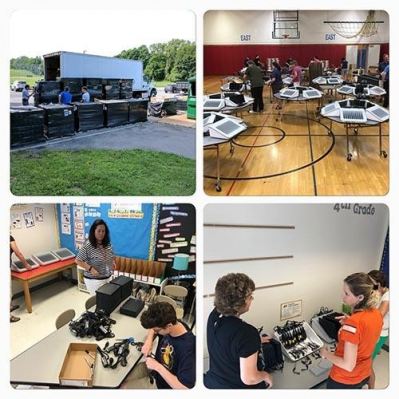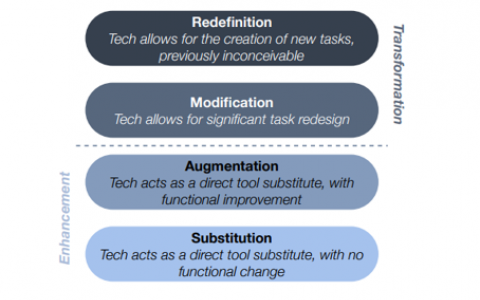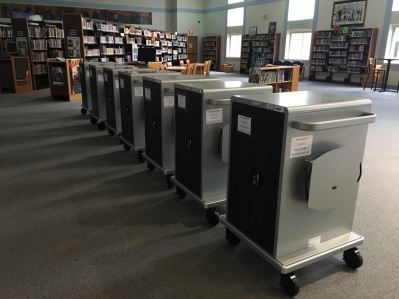West Genesee Central School District - Transforming Professional Development
Professional development in schools has traditionally consisted of "sit and get" workshops, before- and after-school workshops, and summer workshops that have made little impact in helping teachers transform their practice. Effective professional development should be on-going, authentic, and job-embedded. The West Genesee Central School District has transformed its approach to professional development by creating a new leadership position for professional development and providing innovative approaches to helping teachers grow their skills.
Background
The New York State Smart Schools Bond Act (SSBA) has put instructional technology at the forefront of many a district’s change initiatives, making innovative teaching and learning a priority across the state. West Genesee Central Schools, located in Camillus, NY, a suburb of Syracuse, with an enrollment of 4,549 students, is no exception. The first round of the District’s Smart Schools Investment Plan (SSIP) called for the acquisition of instructional technology hardware, including 3,641 Chromebooks. The plan was approved in July 2017 and equipment was delivered soon thereafter. By the time students and staff returned for the 2017 school year, 92 elementary classrooms were outfitted with class sets of Chromebooks, and 19 mobile carts with class sets of Chromebooks were distributed to grade level teams at each of the District’s two middle schools and subject-area departments at West Genesee High School. An additional 34 carts with classroom sets of Chromebooks were made available to secondary teacher-leaders who were willing to participate in a Chromebook pilot program to help the district make decisions about future technology investments in a second round of SSBA funding.
The Challenge
The goal of the District’s SSIP is not to implement a 1:1 computing program; rather, it is to implement technology that addresses the instructional and administrative needs of the district; ensure that all staff and students are proficient at applying pertinent technology to attain professional and academic goals; and increase support and access to instructional technology including but not limited to professional development, human resources and equipment. To that end, the District faces a challenge in terms of providing professional development for teachers to ensure that the equipment that was purchased is used in meaningful ways that align with the District’s Strategic Plan. Dr. Ruben Puentedura's “SAMR Model,” a framework for teachers to assess their lesson design and technology’s role in it, has been instrumental in helping teachers understand the goals of the District’s technology investments to transform teaching and learning with meaningful instructional technology integration.
“SAMR” stands for Substitution-Augmentation-Modification-Redefinition. At the Substitution level, technology acts as a direct tool substitute with no functional change. Imagine a writing assignment in which technology like a word processor acts as a substitute for traditional writing with pen and paper. At the Augmentation level, technology acts as a direct substitute with functional improvement. Let’s take our same writing assignment and augment the task with a word processor’s spell check functionality. The Substitution and Augmentation rungs of the SAMR ladder allow for enhancement of the task through instructional technology integration, but the task has generally remained the same. Ultimately, the District would like teachers to strive for the Modification and Redefinition levels to transform their lessons in meaningful ways. At the Modification level, technology allows for significant task redesign. With our writing task, for example, teachers can modify the task by allowing students to leverage collaborative tools like Google Docs to peer-edit one another’s work in real time. At the Redefinition level, technology allows for the creation of new tasks, previously inconceivable. Our writing task can be transformed into a multimedia project in which students storyboard their ideas, create a video to demonstrate their understanding of the task, publish their work publicly, and interact with a global audience.
While West Genesee is not a newcomer when it comes to Google’s education platform, (the District adopted Google for Education in 2012), the availability of Chromebooks in the classrooms for student use is unprecedented. Most teachers have experience leveraging Gmail and Google Drive for communication and collaboration. Few, however, have transformed their practice with meaningful instructional technology tools and strategies. In light of the District’s SSIP as well as the Strategic Plan, a new leadership position entitled Coordinator of Instructional Technology Training was created to facilitate professional development throughout the district.
Addressing the Challenge
In the past, professional development has traditionally consisted of "sit and get" workshops that offer little opportunity to effectively impact teachers’ professional practice, before- and after-school workshops that interfere with teachers’ busy personal schedules, and summer workshops that conflict with teachers’ travel plans. Nonetheless, teachers are expected to continuously learn new pedagogy, address new standards, and embrace the latest technology trends. There never seems to be enough time for meaningful professional development. Effective professional development should be on-going, authentic, and job-embedded. At West Genesee, several new professional development initiatives have been put in place to support teachers’ professional growth.
- Online Professional Development offers teachers an opportunity to grow professionally with the availability of 24/7 access to practical learning experiences. Teachers can learn a new skill as they prepare authentic lessons for their students. They can also participate in an active learning community that provides a collaborative space to reflect on their practice with the support and inspiration of their peers. With the new Coordinator of Instructional Technology Training position, several online classes have been developed that leverage instructional tools like Google Sites to deliver content, and Google Classroom to foster discussion. Teachers can participate at their own pace under the guidance of an instructional technology leader.
- Screencasts provide "just in time" access to instructional video tutorials to help build capacity. Support materials are available when needed and teachers can learn new skills at their own pace.
- Coaching provides job-embedded expertise to help transform practice in real-time. In collaboration with teachers, instructional coaches can help plan meaningful lessons, observe teachers and offer constructive feedback, and model lessons to demonstrate effective practice. The West Genesee Central School District is fortunate to have a Coordinator of Instructional Technology Training as well as a Director of Student-Centered Technology Initiatives to support teachers’ change initiatives. There is also a cadre of Instructional Technology Support Assistants (ITSAs) in each of the District’s eight buildings to help with hardware and software issues when they arise.
Spotlight: Online Professional Development
One specific example of West Genesee’s innovative approach to professional development is an online class based on the SAMR Model called “Teach Above the Line.” The intended audience for this online learning opportunity includes teachers who submitted an action plan that articulates their goals for leveraging their own classroom set of Chromebooks. After their proposals were reviewed, each teacher met with the Assistant Superintendent for Curriculum and Instruction, the Director of Technology, and the Coordinator of Instructional Technology Training to discuss how they intend to transform their teaching through meaningful instructional technology integration. Carts with classroom sets of Chromebooks are to be delivered in early October, after which, teachers will begin the process of transforming a lesson or unit through their participation in the online class as they simultaneously have exclusive access to a class set of Chromebooks. The weekly agenda for the Teach Above the Line class is as follows:
- Week 1: Teachers will introduce themselves to one another via Google Classroom in addition to reflecting on their vision for integrating technology into their professional practice through the SAMR lens.
- Week 2: Teachers will share a traditional lesson plan via Google Docs that they would like to teach in the coming weeks and will articulate their lesson goals and vision for integrating technology into their lesson.
- Week 3: Teachers will collaborate with the Coordinator of Instructional Technology Training via Google Docs to discuss opportunities to integrate meaningful instructional technology tools and strategies into their lessons.
- Week 4: Teachers will work with the Coordinator of Instructional Technology Training to learn how to use the instructional technology tools and strategies that were agreed upon in the previous week’s work. Custom screencasts and other support materials will be shared with teachers to provide “just in time” personalized learning.
- Week 5: Teachers will deploy their transformed lesson plans with their students and reflect on how it impacted student learning.
In addition to taking part in the online class, pilot program participants will also meet face-to-face after 30, 60, and 90 days to discuss the benchmarks for success they articulated in their action plans as well as the challenges they have experienced. By March of 2018, each of the participants in the Chromebook pilot program will lead an informational workshop on a designated Superintendent’s Conference Day to help build capacity among their peers.
Impact on Decision-Making
The District has a substantial sum of money available for phase II of its Smart Schools Investment Plan. It is hoped that the experience of those who are participating in the Chromebook pilot program will help build capacity among their colleagues as lesson redesign with a focus on 21st-century skill development becomes more ubiquitous throughout the district. Based on the experience of those who are currently participating in the pilot program, the District may consider implementing a 1:1 computing model in which every student at the secondary level is assigned a Chromebook to use in school.
References
- Morton, G. [gmortonwghs]. (2017, August 18). Ready for deployment - these Chromebook carts are full and ready to be used this year at WGHS! @WestGeneseeCSD [Tweet].
- Puentedura, R. R., Ph.D. (2015, October 15). SAMR: a brief introduction [Blog post].
- Russell, B. (2017, September 29). Smart schools bond act money provides new technology.
Contact
Robert Leo, Coordinator of Instructional Technology Training, West Genesee Central School District, rleo@westgenesee.org








